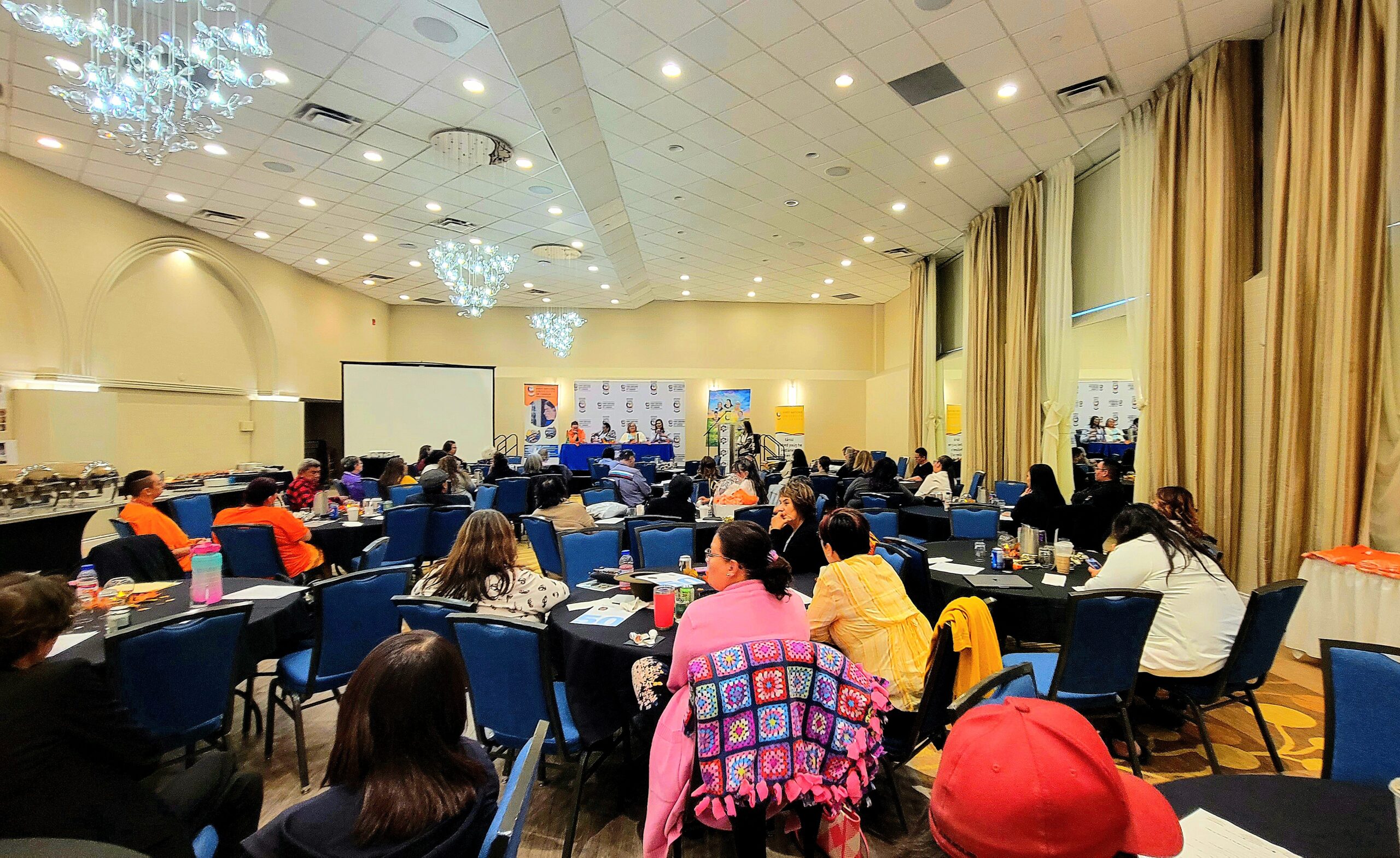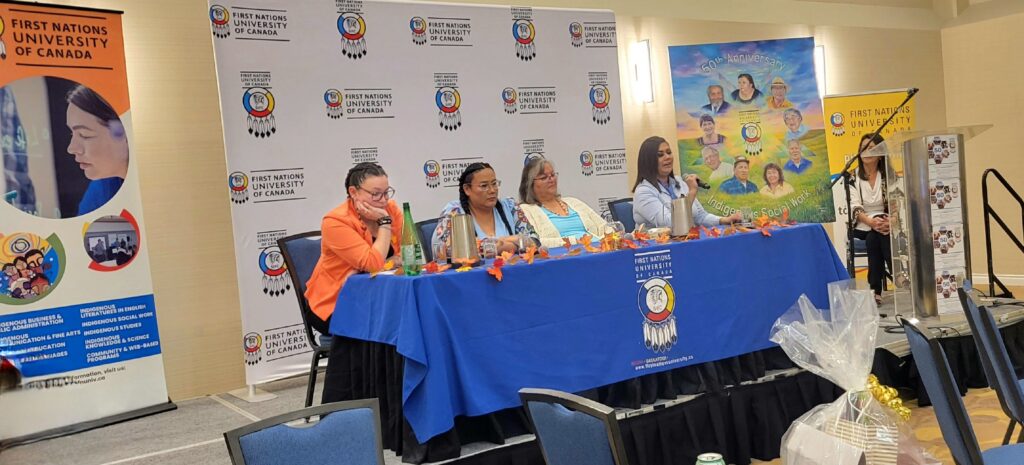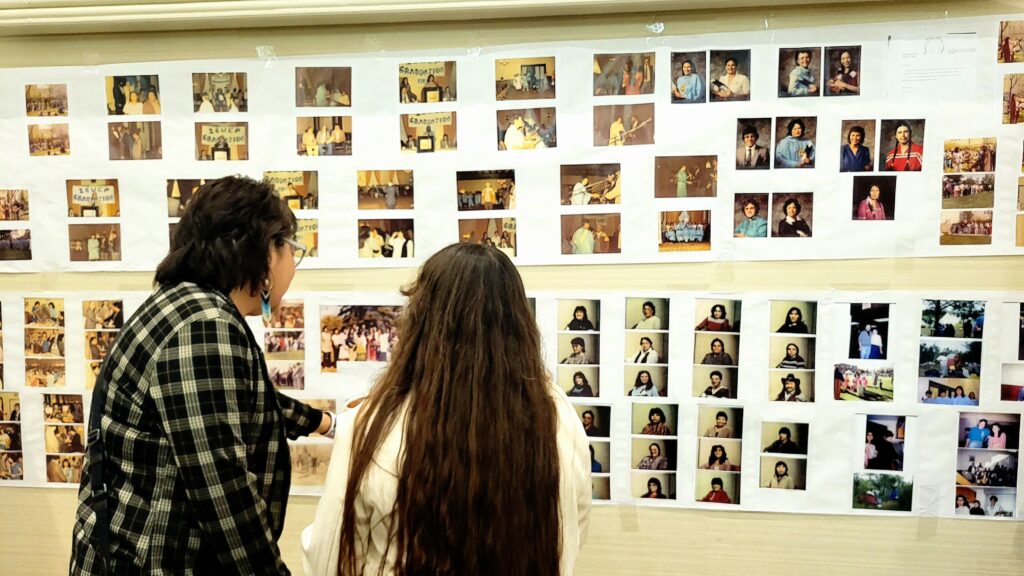
Sitting in the audience at the First Nations University of Canada (FNUniv) Indigenous Social Work (INSW) Program’s 50th Anniversary conference brings back fond memories for teacher, knowledge keeper, Kahteyak member, and residential school survivor, Gilbert Kewistep. Kewistep says he was a ‘late bloomer’ in his educational journey. He began university in his late 40s, and he convocated with his bachelors in his early 50s. He then went on to earn a master’s degree, and he was hired at the INSW program as a helper to the late, Danny Musqua.
“Maybe it’s a small part, but being a survivor of residential school, and then leaving there with nothing? I had to find out who I was again,” he says.
“Now, I’m teaching students things that were taken away from me at these schools, and I get to pass that traditional knowledge on to my students. I even teach my grandson now,” he says proudly.
Kewistep along with former and current students, alumni, faculty members, and staff all gathered in Saskatoon to commemorate 50 years of INSW being a university program, originating even prior to the start of the Saskatchewan Indian Federated College, the original name of First Nations University of Canada. Kewistep says it is good to see that the FNUniv is still honouring the vision of the elders that helped create the INSW program.
“The vision of the elders – it got us here,” he says.
“Having our old ones come in and teach our young people? Those are our textbooks. I always bring in the old people to teach. That’s my way of teaching.”
FNUniv President Jacqueline Ottmann and FSIN Vice Chief Aly Bear welcomed everyone to the event, followed by panel discussions on the history of the university and the INSW program. A large portrait of distinguished members that impacted the INSW program over the past 50 years, painted by artist Cristian Barreno, was presented to the university to cap off the morning.

An alumni panel was held in the afternoon, Lucy Musqua was one of the three women on the panel. Musqua says that one of the greatest successes during her time at the INSW program, and in her career, is teaching people the true history of who Indigenous people are.
“The success is today,” she says.
“We’re still here. 50 years strong and we will continue to grow, to get better, and we will continue to impact one another’s lives.”
Musqua shared the hardships she faced just trying to graduate from the INSW program. It was not easy for her; she told the audience. She says, she even somehow managed to fail the culture camp part of the INSW degree. However, she overcame those challenges, graduated, and is now in a leadership role in her community; a proud councilor for her band: Cegakin, Carry the Kettle, First Nation.
Some of the most prominent people that helped build the INSW program to what it is today were in a video compilation that was shared at the evening gala. The video was graciously created by the Shannon Avision, Associate Professor, FNUniv Indigenous Communication and Fine Arts. The interviews echoed what both Kewistep and Musqua said, that the future of the INSW program is a bright one, with many dedicated staff and students paving new waves in the social work industry, ready to help Indigenous people in whatever capacity they can.
“It’s so inspiring,” Kewistep says, as he reminisces about the students who have graduated and completed the INSW culture camp.
“The INSW camp takes the Indigenous students back to who they really are,” he says, “Being a part of Mother Earth and learning the land-based teachings, and being with the old ones, that is who they are.”
“Incorporating the camp into the (INSW) program at the beginning and integrating that throughout their time at the university is important, because once they’re done, they know already,” says Kewistep.
“They know what our people need.”
Musqua agrees. She says she knows how difficult being an Indigenous social worker can be, but the INSW program prepares the students for whatever challenges they may face.
“Every day is a day where you wake up, and you can say, ‘Have I done enough? Have I helped? How have I helped?’”
“Every day when I get up, I pray. It’s a reflection time to ask yourself those questions, and be honest with yourself, it’s important to be real with yourself,” she says.
“I think that is really, truly, the way you help others in this type of work.”

For more information on the INSW Program please visit:
https://www.fnuniv.ca/academic/undergraduate-programs/indigenous-social-work/
To learn more about the INSW Culture Camp, visit: